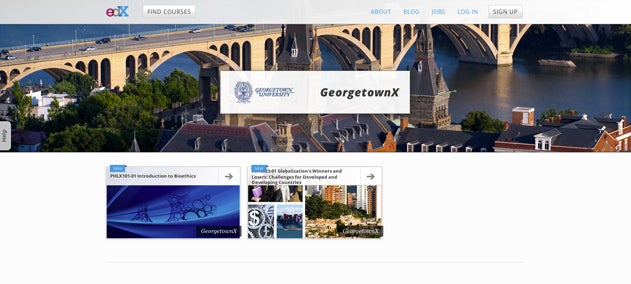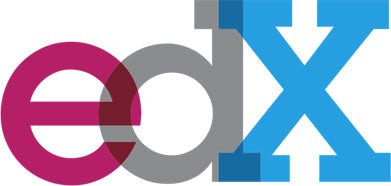Title: GeorgetownX Launches First MOOCs to Engage Global Issues
Georgetown’s first massive open online courses on edX – Introduction to Bioethics and Globalization’s Winners and Losers: Challenges for Developed and Developing Countries – will debut this fall.

Georgetown’s first massive open online courses (MOOCs), using the edX platform, reflect the university’s strengths and its educational mission to engage with and help solve the problems that people face around the globe.
Two courses, Introduction to Bioethics and Globalization’s Winners and Losers: Challenges for Developed and Developing Countries, will be offered this fall.
Georgetown President John J. DeGioia announced in December the university’s partnership with edX, a prestigious new online learning initiative founded by Harvard and MIT.
The not-for-profit enterprise launched in May 2012 and promotes learning for a global audience and interactive study via the web.
Extension of Mission
“These first courses through edX,” DeGioia says, “are an extension of our mission and tradition, which call on us to create and disseminate knowledge in effective, innovative ways, and to speak to some of our world’s most pressing issues.”
All of the Georgetown edX courses in the first cohort are interdisciplinary in their approach to complex problems, featuring faculty from a diverse range of disciplines.
“Our intention is that these and other GeorgetownX courses look both outward and inward,” says Provost Robert Groves, “offering the best of Georgetown for the world and at the same time helping us learn how to leverage emerging virtual learning to change on-campus education.”
The MOOCs
These first courses through edX are an extension of our mission and tradition that call on us to create and disseminate knowledge in effective, innovative ways and to speak to some of our world’s most pressing issues.”
—John J. DeGioia, Georgetown President
Introduction to Bioethics (PHLX 101-01), which will be offered in the fall of 2013, explores some of the most difficult moral challenges the world faces in health, medicine and emerging technologies, including how much control people should have over how and when they die and whether humans should be cloned.
Globalization’s Winners and Losers: Challenges for Developed and Developing Countries (INFX 523-01), also to be offered in the fall, examines how the spread of trade, investment and technology across borders affects firms, workers and communities in developed and developing countries.
GeorgetownX courses on terrorism and counterterrorism, personal genomics and a cluster of MOOCs on human dignity and human rights are in development for 2014.
Signature Strength
Maggie Little, director of Georgetown’s Kennedy Institute for Ethics, is one of the professors teaching the series of edX bioethics courses.
“We are incredibly excited at the prospect of developing a MOOC on one of Georgetown’s signature strengths – bioethics,” Little says. “Together, with Georgetown’s Center for New Designs in Learning and Scholarship (CNDLS), we have assembled an extraordinary team of faculty, instructional design experts and visual designers to develop a course that is not only experimental, but also conscientious.”
Tom Beauchamp, Robert M. Veatch, Rebecca Kukla, Madison Powers, John Keown and Karen Stohr, will join Little in teaching the bioethics ethics series.
The six-week Introduction to Bioethics module is the first of four modules. The second module will be on Clinical Research Ethics, followed by one on environmental justice, with the fourth module to be determined at a later date.
What Georgetown Does Best

All Georgetown’s edX courses in the first cohort are interdisciplinary in their approach to complex problems, featuring faculty from a diverse range of disciplines.
Theodore H. Moran, who holds the Marcus Wallenberg Chair in International Business and Finance at the School of Foreign Service, will teach the globalization course.
“The hope is that this course will showcase a bit of what Georgetown does best, namely, to offer students the opportunity to learn interdisciplinary approaches to some of the most important policy issues and ethical issues of the contemporary period,” Moran says. “What I have done is to take some of the most interesting parts of two courses I offer on the GU campus, and combine them in a way that makes the discussion accessible to a wide variety of participants around the globe.”
Moran plans to continue teaching the courses – Globalization: Challenges for Developed Countries and Business-Investment Negotiations in Developing and Transition Economies – in traditional classrooms.
Technology-Enhanced Learning
Our intention is that these and other GeorgetownX courses look both outward and inward, offering the best of Georgetown for the world and at the same time helping us learn how to leverage emerging virtual learning to change on-campus education.”
—Robert Groves, Georgetown Provost
The edX partnership is part of a larger Initiative on Technology-Enhanced Learning (ITEL) Georgetown launched in December.
Georgetown’s announcement this past November that it was joining edX followed on the heels of Georgetown’s $8 million investment in ITEL.
Last week, the university announced the awarding of more than a half million dollars in ITEL grants to Georgetown faculty for innovation in teaching and learning.
Along with offering online courses, the university will use edX to research how students learn and how technology can enrich learning on campus and use edX tools to create new approaches to teaching on campus at its Washington, D.C., and Doha, Qatar, locations.
“This new partnership offers us an exciting opportunity to continue in this work to enhance learning and research both online and on our campuses,” DeGioia said when announcing the partnership with edX in December, “and to fulfill our mission of creating and disseminating knowledge in innovative and effective new ways.”